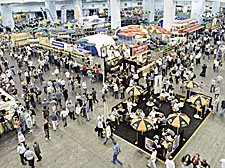|
|
 |
| |

The Great British Beer Festival at Earl’s Court |
Traditional beers are alive and well
Despite the bland big boys, the likes of Rasberry Belters and Bishop’s Farewell are becoming increasingly popular
THE Great British Beer Festival, held at Earl’s Court at the start of this month, where Oakham’s Bishop’s Farewell jostles with Potton’s Village Bike and Leatherbritches’ Raspberry Belter, demonstrates that traditional brewing is alive and kicking. This is not to mention Oakleaf’s Nuptu’Ale and Potbelly’s Beijing Black. These interesting names are a sign of good, distinctive ale.
They tell us that Camra, the Campaign for Real Ale, is not simply a force for diversity in an otherwise bland industry but one to be reckoned with. It organises social events – local, regional and national. It has encouraged live music in pubs, a tradition that had all but died out, and is necessary to bring on a new generation of musicians. It has also put its weight behind the conservation of individual pubs that help to define the character of local communities. It has achieved all this as a predominantly voluntary organisation, operating along strongly co-operative lines.
Each of its 80,000 members is free to play as small or as large a part as he or she chooses.
The current state of the British drinks market is that four giant brewers account for about 80 per cent of all sales, in part due to a series of take-overs and mergers. A merger between Allied Breweries, Whitbread and Watney Combe Reid, each in its own right a force in the drinks industry, created Inbev, an acronym for International Beverages. The other three are Courage, Carlsberg (who own the famous Tetley Brewery in Leeds) and Scottish and Newcastle Breweries.
At the other end of the scale, almost 600 family, regional and micro brewers account for about 15 per cent of total sales in Britain, producing between them some 2,500 different ales.
About half of this is what Camra call ‘real’ (a term they coined) or cask ale. It is stored in wooden barrels and continues to ferment in the barrel, hence the term barrel or (more recently) bottle conditioned. Fifteen years ago 14-15 per cent of all beer was cask conditioned.
The large brewers pay lip-service to real ale. Some Tetley Bitter, for instance, is brewed by traditional methods, but only sold within 20 miles of Leeds. Whilst most beer continues to be produced by industrial methods (sterilised, pasteurised, chilled and carbonated), demand for real ale now appears to be increasing.
For about 95 per cent of the world’s beer drinkers, the word ‘beer’ means lager. This was drunk on a large scale in England up to World War I, when it fell out of favour. Its revival began in Scotland probably in the 1930s, but not in England until the early 1970s. This was largely due to the poor quality of cask conditioned ales and, perhaps, to foreign holidays.
Foreign breweries, testing the English market, allowed their lagers to be brewed under licence, but at lower alcohol levels and with different yeasts to the original. Harp Lager from Guinness, a bland product backed by massive advertising, was a typical example. This is still true with (say) Stella Artois, promoted as ‘reassuringly expensive’ when it is regarded as run of the mill in its Belgian home.
One hopeful sign is the recent appearance of bottle-conditioned ales (so far accounting for 0.01 per cent of sales). These are traditionally brewed and identical to cask conditioned except that they are fermented in glass rather than wood. Young’s Champion Live Beer and Special London Ale are among the most readily available.
Although beer consumption has dropped since 1945, it has remained relatively stable for about the last 14 years, losing two per cent overall. Over the same period, consumption of wines has roughly doubled.
Is there a conflict with wine? ‘No’ says Iain Loe, a policy adviser to Camra. ‘I don’t see wine as the enemy of good quality brewing.’ In the past, he points out, beer sellers were often good vintners as well.
It could be said that Camra’s aims include good beer, good wine, good food, and convivial live entertainment. Beyond this, civility – a better response to binge drinking than anything else yet offered.
For information on joining Camra please call: 01727 867 201. |
 |
|
| |
| |
|
 |
|









